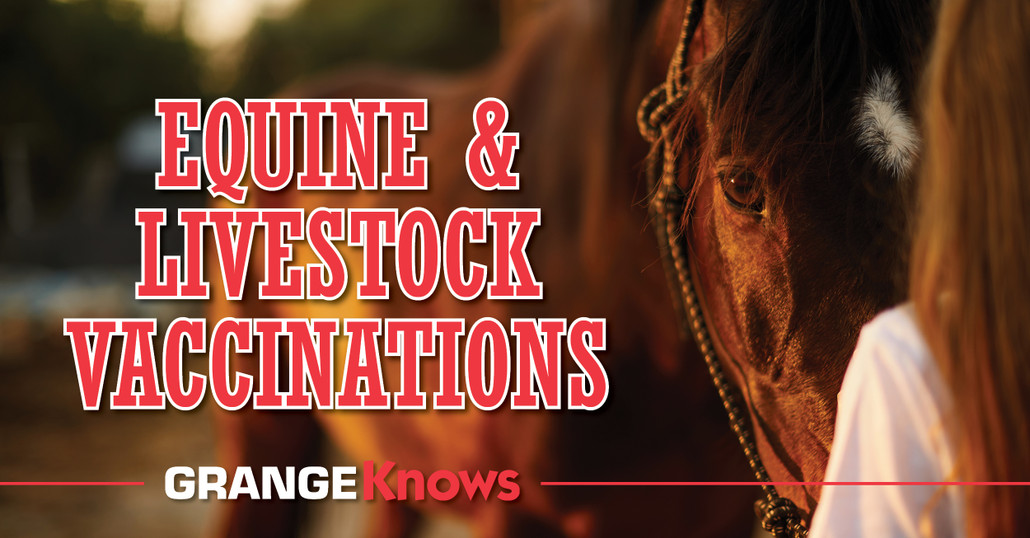
Vaccinations for Equine and Livestock
Posted by Grange Co-op on 10th May 2019
Spring is the time of year when we welcome new babies, vegetation growth, longer days and of course, homestead spring cleaning. It is also the time of year animal owners can send their equine and other livestock out of the barn and into the pastures. With this however, also comes the risk of animal exposure to diseases. At times it is inevitable and unavoidable, but if it can be helped, no one wants to pay money for a vet bill. In this GrangeKnows article we’re going to cover equine and livestock vaccinations.

Let’s talk about disease prevention through routine livestock vaccination. Just as humans receive vaccinations for various illnesses, the same is available for livestock. Ultimately, vaccinating your animals is a personal choice. This article is for informational and educational purposes if you are interested in administering vaccinations available for purchase from our stores and online. We instruct customers to consult with a veterinarian when creating a vaccination plan for your animals. A licensed veterinarian can provide you with knowledge on times to administer, outbreaks or other diseases recommended for vaccination in your area.
Grange Co-op provides a selection of equine vaccines , as well as other livestock vaccinations and antibiotics both in-store and available online. Click the links to shop and read below for more information.
SAFETY
Safety steps need to be taken when handling and administering vaccinations. When purchasing a vaccine, the outside temperature must be considered prior to leaving the store. Vaccines are very sensitive and need to be maintained at 35° to 45° degrees. Ideally, it is best to keep them in a refrigerator, but when transporting, keeping them on ice and/or in a cooler will suffice. When purchasing a vaccination in Grange Co-op, ask an associate for complimentary ice packs to keep the vaccination cool. If the vaccine isn’t properly handled, it loses its effectiveness for preventing any disease outbreaks, resulting in more money spent, and in the long run, possibly loss of livestock. Besides maintaining the temperature of the vaccine, always read the label, make sure to follow the administering instructions and dosage amounts. Double-check expiration dates and if you have any questions or concerns, always check with your veterinarian. This is all critical to proper handling and safe management.

ADMINISTERING VACCINATIONS
The most common way to administer vaccinations are in the muscle (IM), and subcutaneous (SQ), which is under the skin. Whether you are injecting IM or SQ, make sure you are not injecting into a blood vessel. Always call a veterinarian to show you how to properly administer the vaccine if you are unsure. Never stick a dirty needle into a bottle and always use a new, sterile needle when syringes are being refilled. Make sure the spot of injection is also clean and dry.
Needle size is also crucial when administering vaccines. Both the animal and consistency of the vaccine must be considered. Never use a needle that is too big in diameter on an animal that doesn’t need it. This can cause more pain, and with a larger puncture hole in the skin, a greater chance of the product leaking out. If the needle is too small for the consistency of the product, extra force is applied to the needle and syringe to push the liquid out, thus causing undue pain. The diameter of the needle isn’t the only part that needs to be addressed. It is equally important to also check the needle length. When administering into muscle, longer needles are needed, whereas injections given under the skin require shorter needles.
After vaccinating your livestock, watch for any signs of reaction and make sure to record and schedule a booster vaccine. Remember, vaccinating livestock helps save not only your animals, but others as well. Properly vaccinating helps keep outbreaks and transmission of livestock disease under control, especially when transporting to events or out of state sales. Please talk with one of our knowledgeable Grange Livestock and Equine Experts for more information or assistance when shopping for the correct vaccine.
